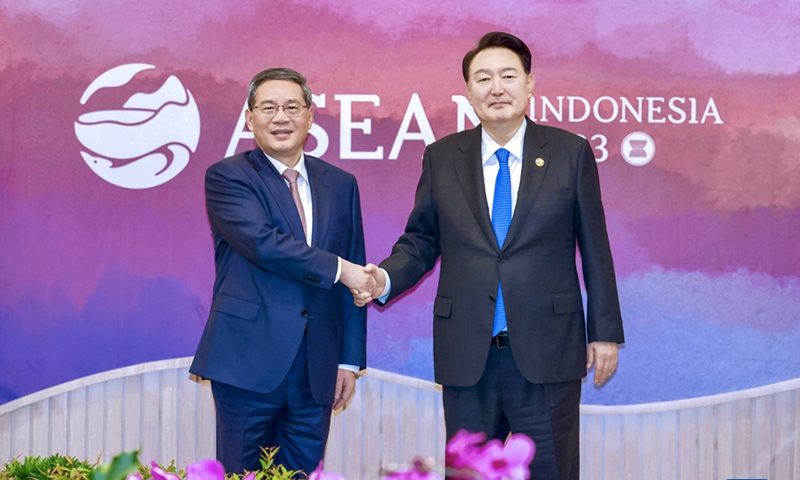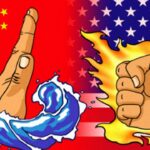Chinese Premier Li Qiang met with South Korean President Yoon Suk-yeol on the sidelines of the leaders’ meetings on East Asia cooperation held in Jakarta, Indonesia, on Thursday, which has garnered extensive attention from both Chinese and South Korean public opinion, especially the latter. Li pointed out that China and South Korea should continuously make the pie of cooperation bigger and better achieve mutual benefit and win-win results while Yoon said the South Korean side is willing to work together with China to practice multilateralism and free trade, and promote the stable and healthy development of the South Korea-China relationship. The meeting itself and the content of the talks have both sent a positive signal. They have brought about a new opportunity, making it possible for China-South Korea ties to get out of the twists and turns caused by the South Korean government’s participation in the US strategy of containing China and incorrect comments made about matters pertaining to China’s primary national interests.
This diplomatic setback between China and South Korea could have been avoided and was unnecessary from the perspective of the Chinese side. It doesn’t serve the interests of both China and South Korea. The fault definitely lies with the South Korean administration, as China’s policy toward South Korea has been consistent and stable, playing with open cards. However, the South Korean government’s perspective is quite different from China’s and has shown certain biases, which has been actively echoed by external third-party factors, resulting in adverse effects on the China-South Korea relationship and the situation in Northeast Asia.
Given such a situation, it is objectively necessary for China and South Korea to strengthen high-level communication, resolve or manage differences as much as possible, eliminate misunderstandings, and avoid damaging existing cooperation. There are no irreconcilable contradictions between China and South Korea, and most of the current problems are artificially created. This has made people feel regrettable toward the current diplomatic setback between China and South Korea. Fortunately, both China and South Korea still have the willingness to improve relations and meet each other halfway. The scope of cooperation between the two countries is extensive and solid, and regional issues and common challenges also drive China and South Korea to coordinate and cooperate. If such China-South Korea relations are ruined by the South Korean side, then Seoul really needs to reflect on it.
Yoon called for the early realization of a “South Korea-Japan-China summit” in Jakarta on Wednesday. He emphasized that South Korea is currently facing complex crises such as geopolitical competition and climate change and the reactivation of cooperation among South Korea, Japan and China will become a stepping stone for a new leap in ASEAN Plus Three cooperation. These remarks are highly consistent with the position frequently expressed by China. However, South Korean media noticed that Yoon changed the order of the commonly used “South Korea-China-Japan” expression in South Korea to “South Korea-Japan-China.” Many South Koreans find it strange, with some netizens sarcastically saying the correct order should be “Japan-South Korea-China.”
It’s evident that the Yoon government has made great effort to express a friendly attitude toward Japan. However, Seoul should observe and consider the concerns, worries, and opposition that have already emerged in South Korea and its surrounding areas. The South Korean government’s willingness to promote “reconciliation” with Japan by compromising its historical dignity is on one hand a result of the Yoon government’s adjustment of its foreign strategy, as well as the content of a script already written by Washington on the other.
After the US-Japan-South Korea Camp David Summit, Seoul, which felt highly valued, clearly gained a great sense of satisfaction in the “friendship” among the three countries, even though this satisfaction came at the expense of South Korea’s own interests and the promotion of confrontation in Northeast Asia. There is a huge gap between Seoul’s self-perception and the views of the outside world, including South Korean society, which needs to be corrected. Seoul needs to truly devote its efforts to dwelling on how to truly integrate South Korea into the general trend of regional peace and stability, rather than prioritizing how to rank China, Japan and South Korea and making itself appear more and more like an “uncertain factor.”
At least for now, we have many reasons to doubt that South Korea is transforming from a relatively independent and balanced role within the US alliance system to an outpost for the US to contain China in Northeast Asia. In this situation, particularly when South Korea emphasizes its “close relationship” with Japan, the balance among China, Japan, and South Korea may be disrupted, which should be taken seriously by the South Korean side. This time, Yoon said, “a new chapter in South Korea-US-Japan cooperation was opened through the recent improvement in South Korea-Japan relations.” This so-called “new chapter” has completely different meanings for different countries.
South Korea is the chair country for China-Japan-South Korea trilateral cooperation, and China has always supported South Korea in playing an active role in promoting trilateral cooperation. Yoon said South Korea plans to work closely with Japan and China to revive trilateral cooperation mechanisms in the near future. If cooperation between the three countries is revitalized, greater momentum will be injected into the cooperation between ASEAN and China, Japan, and South Korea (10+3). We hope that South Korea can truly implement these words and respond to everyone’s concerns.
(Global Times)




